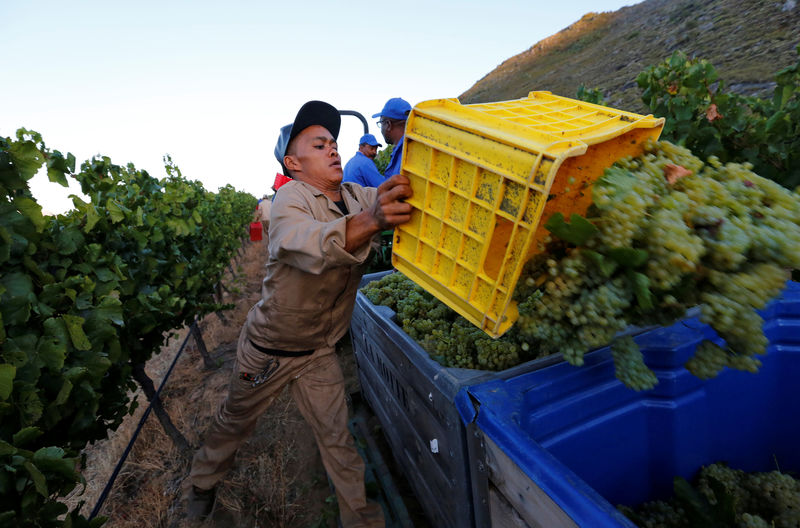By Wendell Roelf
FRANSCHHOEK, South Africa (Reuters) - South African tycoon Koos Bekker sells wine from his vineyard all over the world, but a small detail offers a clue as to where his priorities may lie - all the bottles are labelled in Mandarin.
Other producers along the Stellenbosch wine routes where his
Babylonstoren farm is located are doing the same, looking to tap into soaring demand in China led by a growing professional class as Asia's economic powerhouse in turn ramps up its investments in South Africa.
"Babylonstoren's export strategy to China is to be visible in Beijing, not only the city, but also the province," said Naspers chairman Bekker's cellarmaster Charl Coetzee.
"We only want to conquer Beijing and if we conquer Beijing we will be happy," he said as a young Asian couple sampled his produce in a tasting room overlooking rows of young vines.
South African wine exports to China rose almost 30 percent in 2015 alone, according to statistics from South African Wine Industry Information and Systems (SAWIS).
Alan Winde, minister for economic opportunities in the Western Cape region, says the aim is to double them by 2025.
During his time as chief executive, Bekker helped turn Naspers into one of the world's top e-commerce and media companies and established links with China via a stake in Internet service portal Tencent.
Now he is joining a race to supply the world's most populous nation that also features producers from France - which controls around 50 percent of the wine export market to China - and 'new world' rivals Australia, Chile and New Zealand.
China's retail wine market was worth around $15 billion in 2015 compared to $10.3 billion in 2010, with imports accounting for just over half, according to wine data analytics firm IWSR.
It forecast consumption of about 13.5 million hectolitres in 2020, up from 11.3 million in 2010.
REDS, OR STRONG WHITES
Tapping into a national wine tradition dating back hundreds of years, Babylonstoren grows 13 different grape varieties and its bottles retail between 80 rand ($5) for a chenin blanc and 500 rand ($32) for a champagne-style sparkling white.
In Coetzee's experience, Chinese drinkers tend to prefer red, though they also go for stronger whites including a chardonnay the farm matures in French oak for 12 months.
In March, Babylonstoren sold its largest consignment of wines to China, a 20-foot container with around 13,000 bottles.
"We want ... one day to be exporting a container a month," Coetzee told Reuters.
La Motte wine farm, one of dozens in the verdant hills outside Cape Town, sold around 3 million bottles to China last year, double the amount shipped three years ago.
"The past 12 months there was big growth of South African wine to China," its chief executive Hein Koegelenberg told Reuters from a wine cellar in the Franschhoek Valley, where Huguenots from France first planted vines in 1695.
"South Africa has not unlocked the potential of that market yet."
La Motte, which has partnered with China’s second largest online direct sales network, Perfect China, to buy wines under the brand name L’Huguenot, says its pinotage red ranks among its best sellers in China.
South Africa's wine industry is worth around 26.5 billion rand ($1.8 billion) a year and employs 300,000 people. China has grown to become its sixth largest export market.
"The nice thing is that China takes wine in (own-label) bottles and not in bulk, so we get jobs down the value chain," minister Winde said.
Demand is being driven by a booming number of young Chinese professionals who prefer buying over the Internet, rather than in stores. The rand's 30 percent fall against the dollar in the last year has also helped.
But the industry faces stiff competition if it is to take full advantage of new consumers in places like China.
"We realise that the challenge is to keep getting trade and consumers to trial South African wines and more importantly to retain customers to ensure repeat sales," said Michaela Stander, Asia marketing manager for Wines of South Africa.
"If Chinese consumers are not well informed and not ready to accept our wines, the imports may soon die down again."
